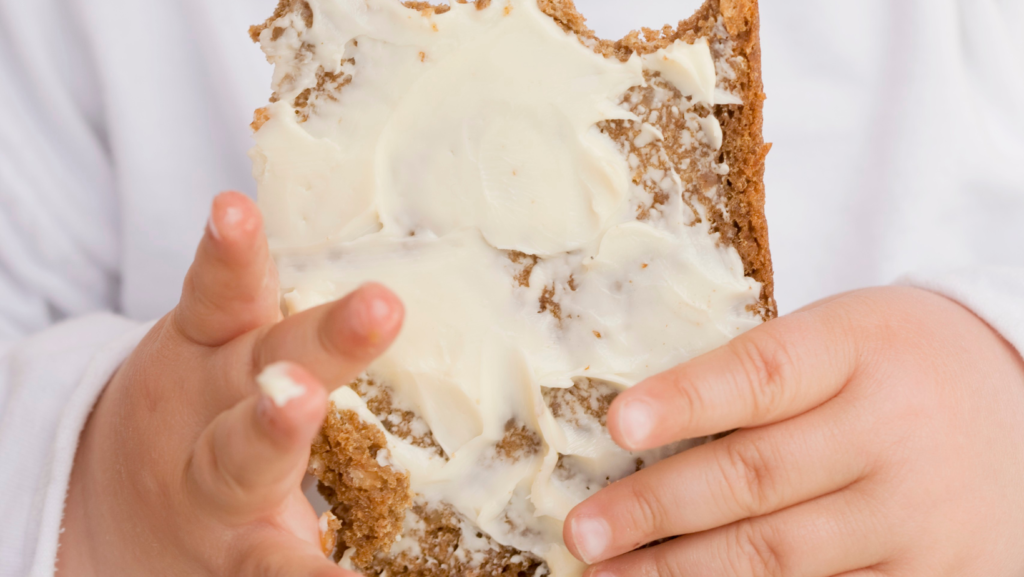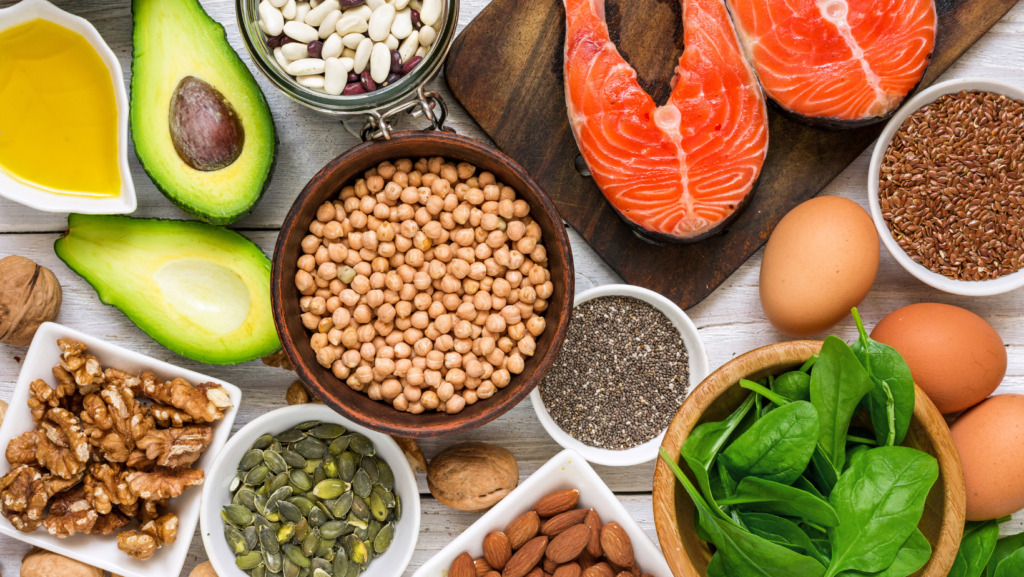Healthy Fats for Babies, Ways to Increase Fat, and Nutrient-Dense Foods when Starting Solids



Some of the links below are affiliate links. At no additional cost to you, I will earn a commission if you click through and make a purchase.
Healthy Fats for Babies
It may be common knowledge that omega-3’s are important healthy fatty acids to include in children’s diets for overall health and brain development, but did you know that fat (yes, even saturated fat) and cholesterol are not something you need to be concerned about limiting in your child’s diet under the age of two years? The current Dietary Guidelines for Americans recommend fat to be unrestricted in the first two years of life.
“Eating healthy for most children doesn’t mean following adult goals for cutting back on total fat, saturated fat, trans fat, and cholesterol, particularly for children younger than 2 years.” – American Academy of Pediatrics
Lipids are considered the most important energy source in the infant diet and are necessary for normal growth and physical activity. Human milk, in which most of the energy is present as fat, provides a relatively high cholesterol intake as well. Mother’s milk and infant formula supply 40–50% of their energy as fat (Fidler et al. 1998).
Mammalian milks, including human milk, contain 50% of their total fatty acids as saturated fatty acids. This is not a mistake. They are there in such high quantities because they play a crucial role in your baby’s neurological development and brain function.
Download our omega-3 guidelines handout here for more information!
“Children and adults need fat in their diets. It supplies essential fatty acids (EFA) and aids in the absorption of fat-soluble vitamins A, D, E and K. It is a substrate for the production of hormones and mediators. Fat, especially in infancy and early childhood, is essential for neurological development and brain function” (Milner and Allison, 1999).
Cholesterol:
The central nervous system is enriched with important classes of lipids, in which cholesterol is known to make up a major portion of myelin sheaths, besides being a structural and functional unit of CNS cell membranes. Unlike in the adult brain, where the cholesterol pool is relatively stable, cholesterol is synthesized and accumulated at the highest rate in the developing brain to meet the needs of rapid brain growth at this stage, which is also a critical period for neuroplasticity. In addition to its biophysical role in membrane organization, cholesterol is crucial for brain development due to its involvement in brain patterning, myelination, neuronal differentiation, and synaptogenesis (Lu F, Ferriero D, Jiang X, 2022).
Cholesterol is needed to make hormones, which regulate the functions of the body. Studies show that children exposed to cholesterol in breast milk appear to have better heart health as they grow. It seems that adults who were breastfed as children have lower levels of bad (LDL) cholesterol and a lower risk of heart disease (Parikh N. et al. 2009). bc nm .v
Infant Weight Gain:
If you are having any concerns with your child’s weight gain, I highly recommend following up with your pediatrician and request a pediatric dietitian referral if they feel anything is concerning. I also want to add that weight and height percentiles are a screening tool and used alone is not a great indicator of the nutritional status of the child.
As long as your child is following their own growth curve, that is what is important. Lower percentile doesn’t equal a less healthy baby as long as they are gaining appropriately for their age and size.

Energy Dense and Nutrient Dense Foods
Your baby’s first foods should be energy dense and nutrient dense!
For the first time ever, the 2020-2025 edition of the Dietary Guidelines for Americans (DGA) includes guidance for feeding infants and toddlers from birth to 24 months old.
Exclusive breastfeeding is recommended as the ideal source of nutrition for infants during the first 6 months of life, with continued breastfeeding until 12 months old and beyond. Starting at approximately 6 months old, it is critical to introduce nutrient-dense complimentary first foods to meet growing nutrient demands.
“Children in this age group consume small quantities of foods, so it’s important to make every bite count.”– DGA, 2020-2025
Besides choosing energy-dense foods, encourage infants and toddlers to consume a variety of foods from all food groups. Include foods rich in iron and zinc, particularly for infants fed human milk.

Tips for increasing calories and fat:
- If your child can tolerate dairy products and does not have a dairy allergy, cheese is a great high-calorie and high-fat food that is easy to add in mixed dishes and to top a variety of foods. Aim for lower sodium and fresher cheeses.
- Now that I have said all that, use these tips below to help increase calories and fat in your little one’s diet to help with weight gain! Remember to try not to pressure your child which can cause negative mealtime associations.
- Use chia and flax seeds as “sprinkles” on your child’s favorite foods! They can be a fun addition to oatmeal, grits, yogurt, and toast while adding beneficial healthy fats and calories. TinySprouts SuperSeed Boosters are specifically designed for babies and can be an easy way to incorporate nutrient dense seeds into every meal, use code: CINDY10 for a discount off your order.
- Remember that your child has very high-fat needs during this period of growth and fat should be unrestricted in children under the age of two. That being said, you can be generous with the oils or butter you use when cooking for your child.
- Focus on energy-dense foods – aka foods with a large number of calories and fat in a small volume (think whole milk yogurt, sardines, ground beef, avocados, eggs, nut, and seed butter, etc.) Check out my full blog post on the best yogurt options for baby here.
If you are concerned about your child’s weight or growth, we recommend seeking support from a trusted healthcare provider. A pediatric dietitian referral can be obtained from your pediatrician for individualized support and recommendations.
Citations:
- John A. Milner, Richard G. Allison, The Role of Dietary Fat in Child Nutrition and Development: Summary of an ASNS Workshop, The Journal of Nutrition, Volume 129, Issue 11, November 1999, Pages 2094–2105
- Lu F, Ferriero DM, Jiang X. Cholesterol in Brain Development and Perinatal Brain Injury: More than a Building Block. Curr Neuropharmacol. 2022;20(7):1400-1412. doi: 10.2174/1570159X19666211111122311. PMID: 34766894; PMCID: PMC9881076.
- Parikh NI, Hwang SJ, Ingelsson E, Benjamin EJ, Fox CS, Vasan RS, Murabito JM. Breastfeeding in infancy and adult cardiovascular disease risk factors. Am J Med. 2009 Jul;122(7):656-63.e1. doi: 10.1016/j.amjmed.2008.11.034. PMID: 19559168; PMCID: PMC2704490.

Cinthia Scott is a Registered Dietitian (RD) and International Board Certified Lactation Consultant (IBCLC) with over 10 years experience in the field of dietetics. Cinthia focuses on ensuring optimal nutrition in the first 1000 days of life to ensure optimal growth and development as well as set the stage for long-term health. Cindy is an author, starting solids expert, and advocate for caregivers receiving evidence based education and support surrounding breastfeeding and starting solids.
Cinthia is co-author of the 101beforeone Starting Solids Book, “101beforeone -baby-led feeding cookbook,” and is the founder and owner of The Baby Dietitian LLC which is her private practice built to provide virtual 1:1 services for caregivers surrounding infant nutrition, toddler nutrition, and breastfeeding support. Cinthia is also the creator of the Starting Solids 101 Program which provides caregivers 1:1 support from a Pediatric Dietitian on how to provide optimal nutrition from the start and create healthy eating habits that will last their whole lifetime. To work with Cinthia, you can access her services here.
Cinthia provides tons of free information for parents on her social media accounts as well.
- Instagram: @The.Baby.Dietitian
- Tiktok: @The.Baby.Dietitian
